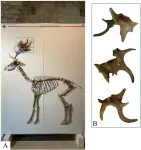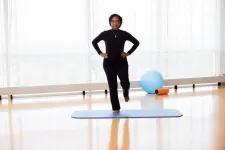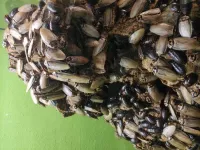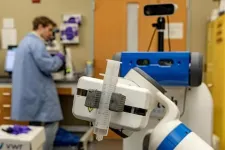EMBARGOED FOR RELEASE UNTIL 4 P.M. ET, WEDNESDAY, OCTOBER 23, 2024
MINNEAPOLIS – People in early middle age who have poor sleep quality, including having difficulty falling or staying asleep, have more signs of poor brain health in late middle age, according to a study published in the October 23, 2024, online issue of Neurology®, the medical journal of the American Academy of Neurology. The study does not prove that poor sleep accelerates brain aging. It only shows an association between poor sleep quality and signs of brain aging.
“Sleep problems have been linked in previous research to poor thinking and memory skills later in life, putting people at higher risk for dementia,” said study author Clémence Cavaillès, PhD, of the University of California San Francisco. “Our study which used brain scans to determine participants’ brain age, suggests that poor sleep is linked to nearly three years of additional brain aging as early as middle age.”
The study included 589 people with an average age of 40 at the start of the study. Participants completed sleep questionnaires both at the beginning of the study and again five years later. Participants had brain scans 15 years after the study began.
Researchers reviewed participants’ responses to questions such as, “Do you usually have trouble falling asleep?” “Do you usually wake up several times at night?” and “Do you usually wake up far too early?” They recorded the number of six poor sleep characteristics for each participant: short sleep duration, bad sleep quality, difficulty falling asleep, difficulty staying asleep, early morning awakening and daytime sleepiness.
Participants were divided into three groups. Those in the low group had no more than one poor sleep characteristic. People in the middle group had two to three, and those in the high group had more than three. At the start of the study, about 70% were in the low group, 22% were in the middle and 8% were in the high group.
Researchers examined participants’ brain scans where the level of brain shrinkage corresponds to a specific age. Researchers used machine learning to determine the brain age for each participant.
After adjusting for factors such as age, sex, high blood pressure and diabetes, researchers found people in the middle group had an average brain age that was 1.6 years older than those in the low group, while those in the high group had an average brain age 2.6 years older.
Of the sleep characteristics, bad sleep quality, difficulty falling asleep, difficulty staying asleep and early morning awakening were linked to greater brain age, especially when people consistently had these poor sleep characteristics over five years.
“Our findings highlight the importance of addressing sleep problems earlier in life to preserve brain health, including maintaining a consistent sleep schedule, exercising, avoiding caffeine and alcohol before going to bed and using relaxation techniques,” said author Kristine Yaffe, MD, of the University of California San Francisco and a member of the American Academy of Neurology. “Future research should focus on finding new ways to improve sleep quality and investigating the long-term impact of sleep on brain health in younger people.”
A limitation of the study was that participants reported their own sleep problems and it is possible they may not have reported them accurately.
The study was funded by the National Institute on Aging.
Learn more about sleep at BrainandLife.org home of the American Academy of Neurology’s free patient and caregiver magazine focused on the intersection of neurologic disease and brain health. Follow Brain & Life® on Facebook, X and Instagram.
When posting to social media channels about this research, we encourage you to use the hashtags #Neurology and #AANscience.
The American Academy of Neurology is the world's largest association of neurologists and neuroscience professionals, with over 40,000 members. The AAN’s mission is to enhance member career fulfillment and promote brain health for all. A neurologist is a doctor with specialized training in diagnosing, treating and managing disorders of the brain and nervous system such as Alzheimer's disease, stroke, concussion, epilepsy, Parkinson's disease, multiple sclerosis, headache and migraine.
For more information about the American Academy of Neurology, visit AAN.com or find us on Facebook, X, Instagram, LinkedIn and YouTube.
END
Could poor sleep in middle age speed up brain aging?
2024-10-23
(Press-News.org)
ELSE PRESS RELEASES FROM THIS DATE:
Fossils unveil how southern Europe’s ecosystem changed through Glacial-Interglacial Stages
2024-10-23
Fossils from more than 600,000 years ago reveal how Southern Europe’s animal community shifted between warm and cold climate fluctuations, according to a study published October 23, 2024 in the open-access journal PLOS ONE by Beniamino Mecozzi from the Sapienza Università di Roma, Italy and colleagues.
The Notarchirico site has long been valued as a source of information on the Early-Middle Pleistocene, with fossils stretching from around 695 thousand to 614 thousand years ago. The authors of the present study examined mammalian fossils at the site and how they might ...
Your ability to balance on one leg may be a reliable indicator of neuromuscular aging, with men and women showing significant declines over the decades
2024-10-23
Your ability to balance on one leg may be a reliable indicator of neuromuscular aging, with men and women showing significant declines over the decades
###
Article URL: https://journals.plos.org/plosone/article?id=10.1371/journal.pone.0310764
Article Title: Age-related changes in gait, balance, and strength parameters: A cross-sectional study
Author Countries: U.S., Taiwan
Funding: AR-K25AG068368 RJP-Robert and Arlene Kogod Professorship in Geriatric Medicine KRK-W. Hall Wendel, Jr. Musculoskeletal Professorship The funders had no role in study design, data collection and analysis, decision to publish, or preparation of the manuscript. END ...
Most young adults in the UK consider non-consensual condom removal during sex to be wrong and a violation of consent, with almost 9 in 10 seeing it as a form of sexual assault, per survey of 18-25-yea
2024-10-23
Most young adults in the UK consider non-consensual condom removal during sex to be wrong and a violation of consent, with almost 9 in 10 seeing it as a form of sexual assault, per survey of 18-25-year-olds
###
Article URL: https://journals.plos.org/plosone/article?id=10.1371/journal.pone.0298561
Article Title: A UK survey of young people’s views on condom removal during sex
Author Countries: U.K.
Funding: The author(s) received no specific funding for this work. END ...
Under climate change scenarios, 30-44% more land in Ethiopia might become suitable for growing arabica coffee by 2080, although some cultivated areas might also become unsuitable, per modelling study
2024-10-23
Under climate change scenarios, 30-44% more land in Ethiopia might become suitable for growing arabica coffee by 2080, although some cultivated areas might also become unsuitable, per modelling study
###
Article URL: https://journals.plos.org/plosone/article?id=10.1371/journal.pone.0310945
Article Title: Analysis of current and future bioclimatic suitability for C. arabica production in Ethiopia
Author Countries: Ethiopia
Funding: The author(s) received no specific funding for this work. END ...
Cockroaches and maggots might be able to turn an invasive seaweed into a high quality compost, finds a new experimental study which provides hope for the environment and the circular economy
2024-10-23
Cockroaches and maggots might be able to turn an invasive seaweed into a high quality compost, finds a new experimental study which provides hope for the environment and the circular economy
###
Article URL: https://journals.plos.org/plosone/article?id=10.1371/journal.pone.0311483
Article Title: Invertebrate composting quality of the invasive alga Rugulopteryx okamurae, prospects for its bio-recycling, management and circular economy
Author Countries: Spain
Funding: All the financial support has been received by professor Jose Carlos García-Gómez and any funder have influence in the research. The details are: - JCGG (68/83 / 4081/0171) Organization of American ...
Implantable device may prevent death from opioid overdose
2024-10-23
The opioid epidemic claims more 70,000 lives each year in the U.S., and lifesaving interventions are urgently needed. Although naloxone, sold as an over-the-counter nasal spray or injectable, saves lives by quickly restoring normal breathing during an overdose, administrating the medication requires a knowledgeable bystander – limiting its lifesaving potential.
A team from Washington University School of Medicine in St. Louis and Northwestern University in Chicago has developed a device that may rescue people from overdose without bystander help. In animal studies, the researchers found that the implantable device detects an overdose, rapidly delivers naloxone ...
Half of young adults support prison time for non-consensual condom removal
2024-10-23
Almost nine in 10 young adults in the UK believe that removing a condom during sex without the other person’s permission is sexual assault, and around half support prison time as a penalty, finds a new study by UCL researchers.
This is the first UK study to cover views on non-consensual condom removal. It is published in PLOS ONE and surveyed 1,729 people between the ages of 18 and 25, living in the UK.
Young people were chosen as the focus of the study as, out of all demographics, they use condoms the most.
The survey consisted of several examples of non-consensual condom removal, which ...
‘Paleo-robots’ to help scientists understand how fish started to walk on land
2024-10-23
The transition from water to land is one of the most significant events in the history of life on Earth. Now, a team of roboticists, palaeontologists and biologists is using robots to study how the ancestors of modern land animals transitioned from swimming to walking, about 390 million years ago.
Writing in the journal Science Robotics, the research team, led by the University of Cambridge, outline how ‘palaeo-inspired robotics’ could provide a valuable experimental approach to studying how the pectoral and pelvic fins of ancient fish evolved ...
Study: Robotic automation, AI will speed up scientific progress in science laboratories
2024-10-23
Science laboratories across disciplines—chemistry, biochemistry and materials science—are on the verge of a sweeping transformation as robotic automation and AI lead to faster and more precise experiments that unlock breakthroughs in fields like health, energy and electronics, according to UNC-Chapel Hill researchers in the paper, “Transforming Science Labs into Automated Factories of Discovery,” published in Science Robotics, the most prestigious journal covering robotics research.
“Today, the development of new molecules, materials and chemical systems requires ...
Paleontologists discover Colorado ‘swamp dweller’ that lived alongside dinosaurs
2024-10-23
A team of paleontologists working near Rangely, Colorado, has uncovered a new (or, more accurately, very old) state resident—a fossil mammal about the size of a muskrat that may have scurried through swamps during the Age of Dinosaurs.
The researchers, led by the University of Colorado Boulder’s Jaelyn Eberle, published their findings Oct. 23 in the journal PLOS ONE.
Eberle and her colleagues named their discovery, which they identified from a piece of jawbone and three molar teeth, Heleocola piceanus. The animal lived in Colorado roughly 70 to 75 million years ago—a time when a vast inland sea covered ...







